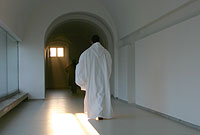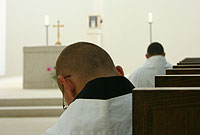Cistercian life at Nový Dvůr
Prayer
“Before all else, love the Lord God with all your heart, all your soul and all your force, then love your neighbor as yourself.”
Saint Benedict, Rule for Monks, Chapter 4
“If a monk desires to pray secretly, he should enter the church simply and pray: not with great shouts, but with tears and fervor of the heart.”
Saint Benedict, Rule for Monks, Chapter 52.
“Do not let anyone occupy your heart, but God alone.”
Saint Theophane of Tambov
It is above all a question of faith, a firm adhesion, without any support, where great things are at stake. In order to remain attentive to the Lord who is present, there is a manner of doing things that one would hardly call a method, unless one retains the etymology of this word: a way or path, a set of reference points from which each person must forge his own experience according to his personal grace, guided by an elder.
Each person, in effect, can turn himself to God, even without knowing it. But the practice of prayer – attentive personal and quiet presence before the Holy Sacrament – orients our life. We learn to remain in an attitude of prayer for a long time, occupied simply by a vocal prayer, invocations or a reading. We have grasped the fact that the desire to turn ourselves towards God, even when this is mixed with other desires, can happen with the help of divine grace.
And let us not distinguish between prayer from God and prayer from the man: there is only one side, everything comes from God, and yet the man really prays... Prayer in fact is a volontary commitment, consented in the action of the Christ Savior. If only we would care to lift the veil which blocks our vision, so overaccustomed to these realities, we would understand how much prayer is serious and simple in its accomplishment but ambitious in its result.
Outside of God, of the Faith, monks have no meaning and serve no useful end. the monk, himself, knows – since he shares the faith of the Churh – that his vocation is mysteriously useful, mysteriously efficient for his brothers and sisters of mankind: he knows that it his participation, imperfect and unfaithful, in the life, the Passion and the sorrowful and solitary death of Our Lord Jesus Christ, who in this way saved humanity.
It is also for this reason that the monk prays. Burying his prayer in the prayer of Jesus, he prays for all men, living and dead, believers and non-believers, those dear to him and those he knows not. Not so that, from bad they might become good... but so that all may have access to goodness and truth. This is the prayer of substitution or of intercession.




